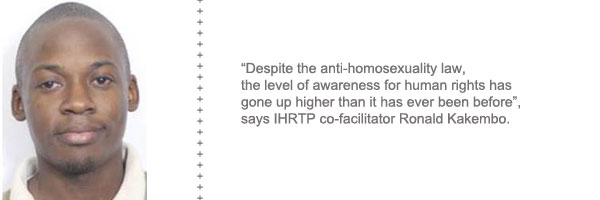The anti-homosexuality law that was passed in Uganda last February was a major setback for human rights defenders. It allows life imprisonment for acts of “aggravated homosexuality” and criminalises the “promotion of homosexuality”. The civil society, however, didn’t remain quiet. As IHRTP co-facilitator Ronald Kakembo reports in this interview, the human rights education and the awareness campaigns of the past years in Uganda could help change the outcome.
Equitas: How would you describe the current human rights situation in Uganda?
Ronald Kakembo: Despite the anti-homosexuality law, the human rights situation has significantly improved over the last 15 years. Many people are living in conditions that are far from being fair, but the level of awareness for human rights has gone up higher than it has ever been before. The civil society is more vibrant than ever and the citizen’s engagement has also peaked up. More importantly, the scope of the human rights concerns in the public sphere has expanded. Political rights activism broadened to include economic, social and cultural rights.
E: How do you explain the anti-gay law and protest then?
RK: Looking from the outside, there’s no doubt that the situation is very bad. When you look from the perspective of history, however, you can start to see a beginning of improvement. Because 10-15 years ago there would have been no public discussion on homosexuality. At the time, people were even afraid of speaking out in matters of LGBTI. You would be “excommunicated” from your community. Now a lot of work is being done by the civil society to appeal the act.

The courts are being used much more than they were in the past to defend human rights, and they’re providing more room for discussions. Despite the law, many people aren’t afraid of speaking out. Even children at school are discussing the matter.
E: What made that change possible?
RK: Improvement is due in large part to civic education. There’s been a concerted effort over the past 5 years to carry out awareness campaigns. People are being told more and more about their rights, about the responsibilities of their leaders, when they can speak out and what they should not accept. They learn that their voice count. Also, the awareness campaigns have not been confined to workshops only. It is becoming more of a “citizen awareness” and people are using new media more than ever before to air out and bring out their views about bad governance and corruption.
Human Rights Education is very vital. Without education and knowledge of information the people remain blind and don’t know what is due to them. A repetition of the message is also required. That is why education must remain the cornerstone of everything that we do. More engaging, proactive measures have to be presented to the general public; tactics have to be developed. We still have a lot of work to do!
Ronald Kakembo is a consultant with Front Line Defenders in Sub-Saharan Africa. He will be co-facilitating at the International Human Rights Training Program in Montreal, June 8-27, 2014.